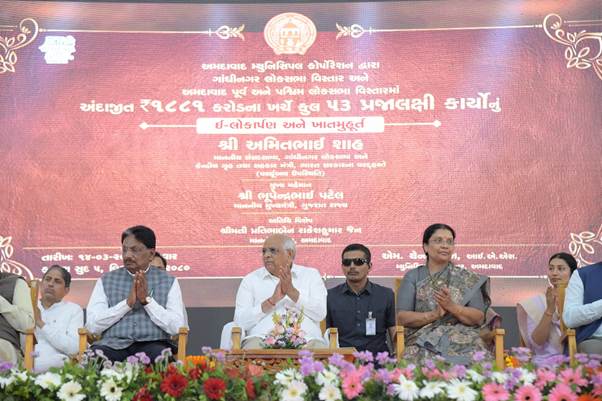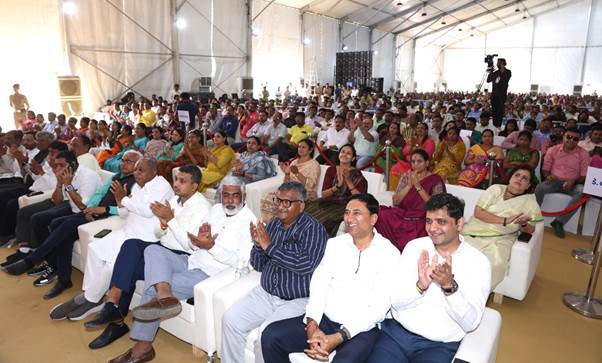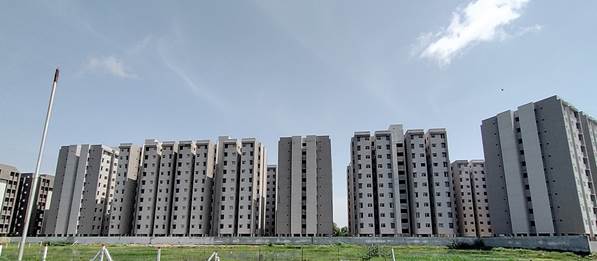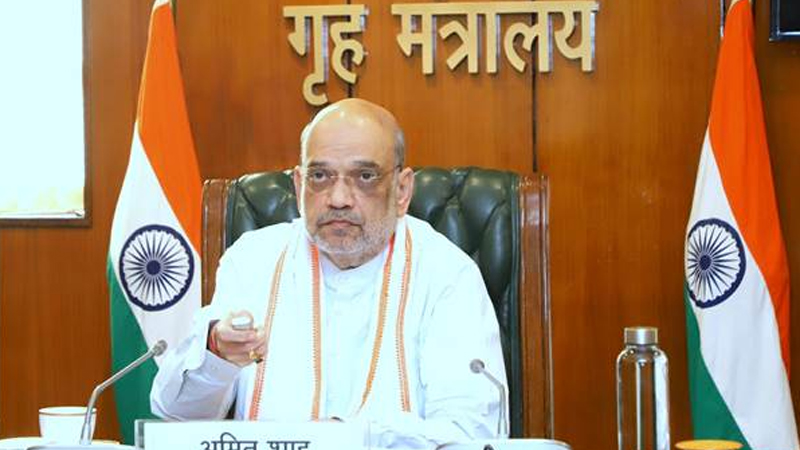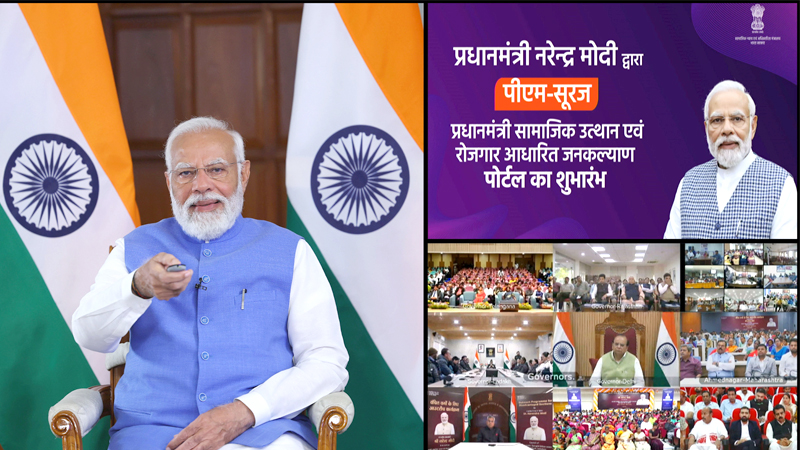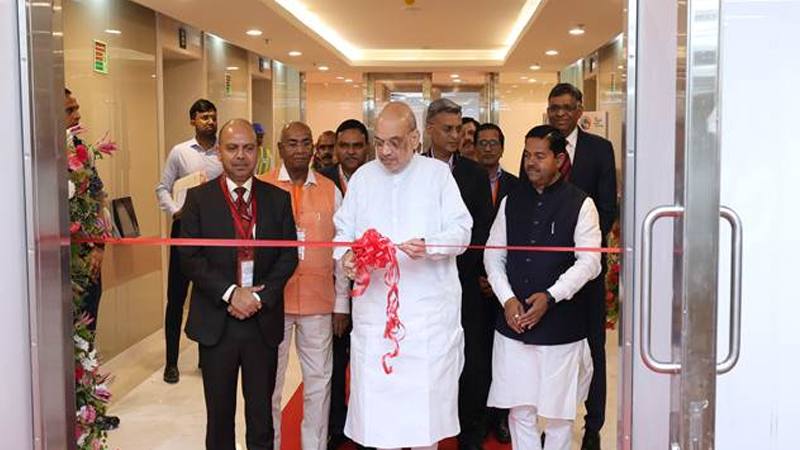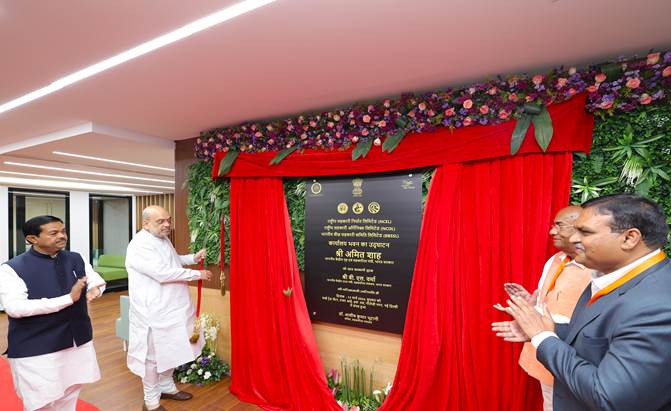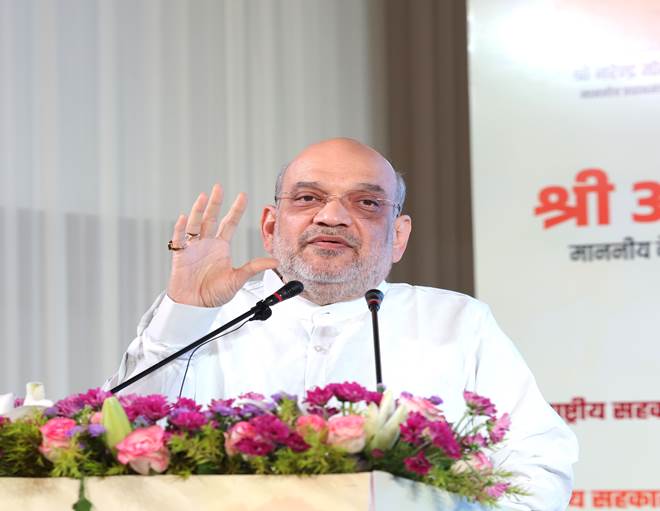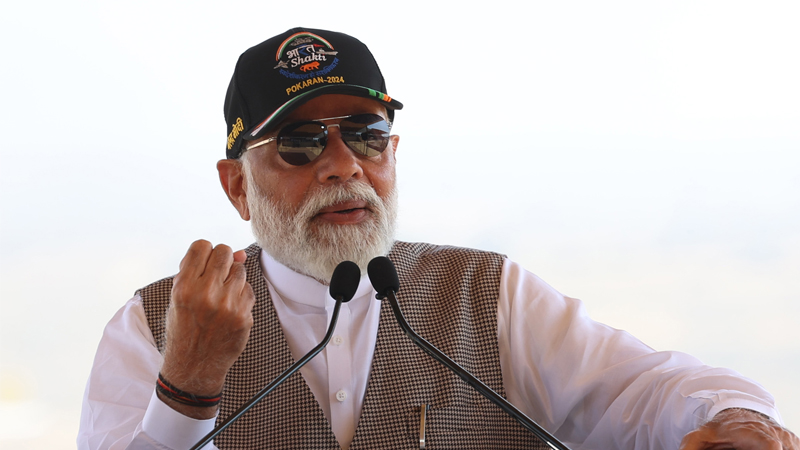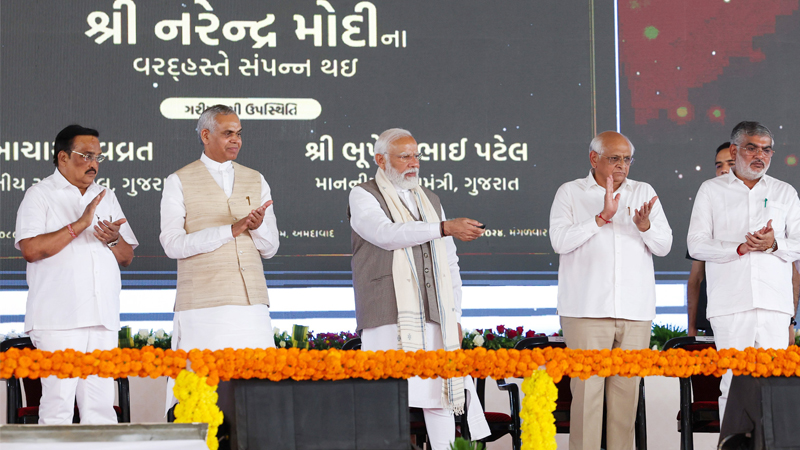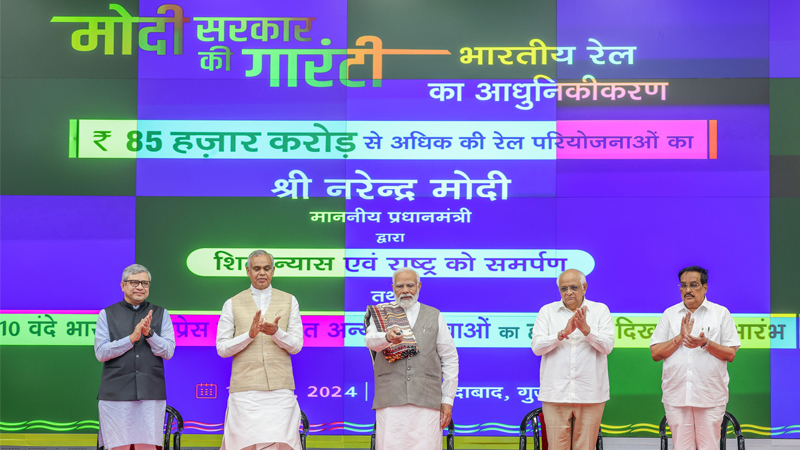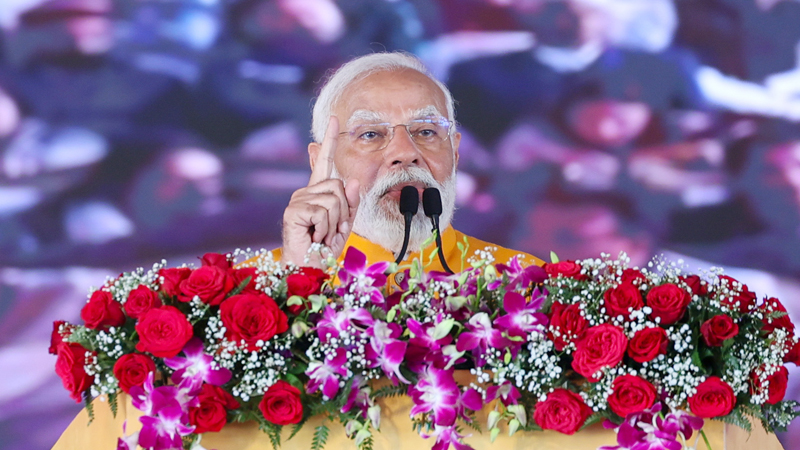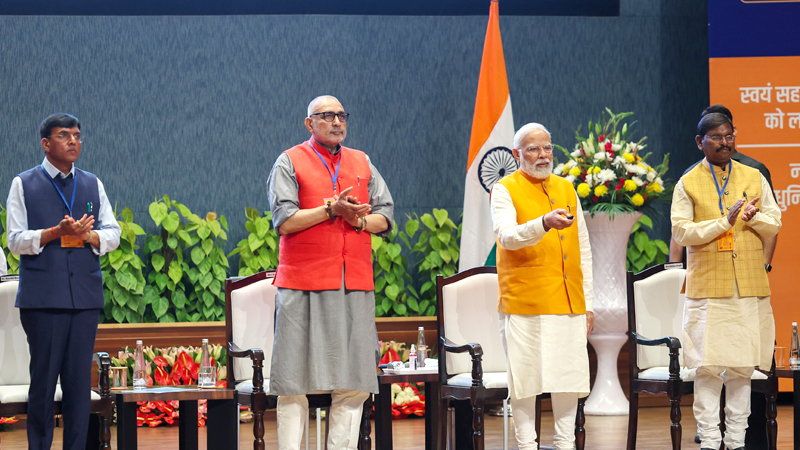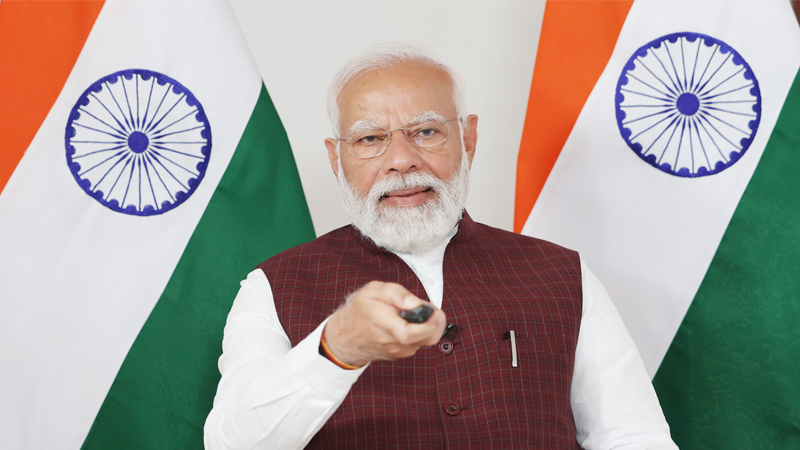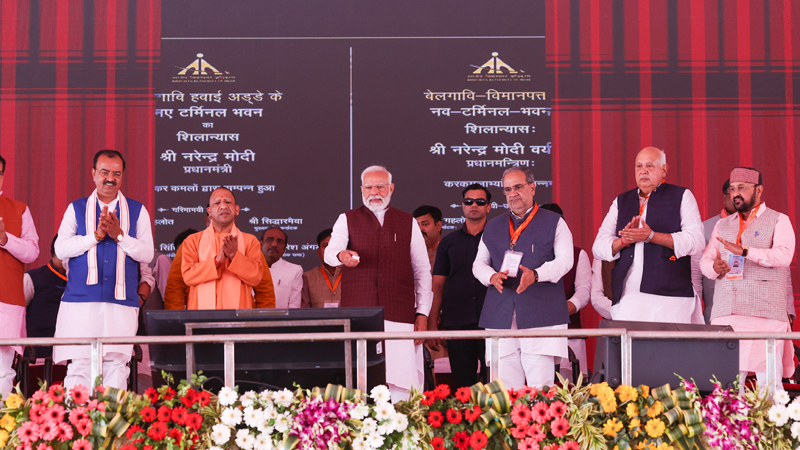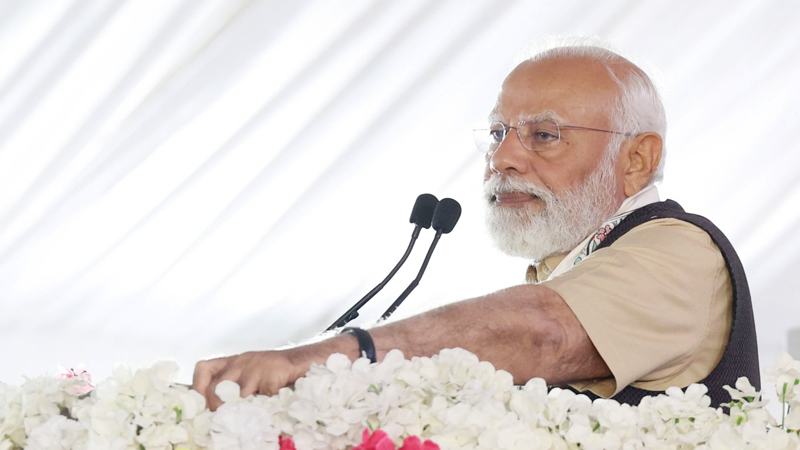The Prime Minister, Shri Narendra Modi dedicated to the nation and laid the foundation stone of various developmental projects worth over Rs 1,06,000 crores at Dedicated Freight Corridor’s Operation Control Centre in Ahmedabad, Gujarat today. The development projects of today encompass multiple sectors including railway infrastructure, connectivity and petrochemicals. He also flagged off 10 new Vande Bharat trains.
Addressing the occasion, the Prime Minister acknowledged the lakhs of people connected to the event from more than 200 different places and said that the scale and size of today’s event cannot be matched with any other event in Railways’ history. He also congratulated Railways for today’s event. The Prime Minister underlined that development works for the creation of Viksit Bharat are continuously expanding with the inauguration and laying the foundation stone of multiple development projects across the country. “In the 75 days of 2024, projects worth more than Rs 11 lakh crores have been inaugurated or foundation stones laid while projects worth Rs 7 lakh crores have been unveiled in the last 10-12 days”, the Prime Minister remarked. Noting that today’s organization is a crucial step towards accomplishing the goal of Viksit Bharat, the Prime Minister said that projects worth about Rs 1 lakh crore have been inaugurated or foundation stones laid where projects worth around Rs 85,000 crores are dedicated to railways. He also touched upon laying the foundation Stone of Petrochemicals complex of Petronet LNG at Dahej worth more than Rs 20,000 crores and informed that it will help boost hydrogen production and demand for polypropylene in the country. Referring to the foundation stone laying of Ekta Malls in Maharashtra and Gujarat, PM Modi said that it will take India’s cottage industry and handicrafts to every corner of the country, thereby emboldening the government’s mission for Vocal for Local and strengthening the foundations of Viksit Bharat. Reiterating the young demographics of India, the Prime Minister told the nation’s youth that today’s inaugurations are for their present and today’s foundation stones guarantee their bright future.
Referring to the incremental approach of the Railway Budgets before 2014, the Prime Minister talked about the inclusion of the Railway Budget in the General Budget that made it possible to provide railway expenditure from the General Budget. Apart from the issues of lack of punctuality, cleanliness and general amenities, the Prime Minister said that before 2014, 6 capitals of the Northeast did not have railway connectivity and there were more than 10,000 unmanned railway crossings, and only 35 percent of railway lines were electrified and railway reservations were marred by corruption and long queues.
The Prime Minister said, “Our government has displayed the willpower to bring the railways out of those hellish conditions. Now Railways development is among the top priorities of the government.” The Prime Minister listed initiatives like a six-fold budget increase from 2014 and assured the countrymen that in the next 5 years, the transformation of railways will exceed their imagination. “This 10 year’s work is just a trailer. I have a long way to go”, he added. He informed that not only most of the states have got Vande Bharat trains but the century of Vande Bharat Trains has already been hit. Vande Bharat Network is touching 250 districts of the country. In deference to people’s wishes, routes of Vande Bharat are being extended.
Noting Railways’ critical role in a nation becoming developed and economically competent, the Prime Minister said, “Transformation of railway is the guarantee of Viksit Bharat.” He threw light on the transforming landscape of railways and mentioned laying railway tracks at a fast pace, redevelopment of more than 1300 railway stations, flagging off next-generation trains like Vande Bharat, NaMo Bharat and Amrit Bharat, and unveiling of modernized railway engines and coach factories.
The Prime Minister said that under Gati Shakti Cargo Terminal Policy, construction of Cargo terminal has increased as land leasing policy has been simplified and has been made online leading to transparency. He also mentioned the establishment of Gati Shakti University. The Prime Minister continued with the modernization-related initiatives of railway and informed about the project of abolishing unmanned crossing and automatic signaling systems. He said that the country is moving towards 100 percent electrification. Solar-powered stations and Jan Aushadhi Kendras are coming up on stations.
“The manufacturing of these railway trains, tracks and stations is creating an ecosystem of Made in India”, the Prime Minister said. He informed that Made in India locomotives and coaches are being exported to countries like Sri Lanka, Mozambique, Senegal, Myanmar and Sudan. He said that demand for Made in India semi high-speed trains would lead to the emergence of many more such factories. “Rejuvenation of railway, new investments guarantees new employment opportunities”, the Prime Minister remarked.
The Prime Minister criticized those who link these initiatives with elections. “For us, these development projects are not for forming a government but they are a mission of nation building” Next generation will not face the problem of the previous generations and ‘this is Modi’s guarantee”, he said.
The Prime Minister presented Eastern and Western dedicated freight corridors as an example of development in the last 10 years. This separate track for goods trains improves speed and is important for agriculture, industry, export and business. In the last 10 years, this freight corridor, connecting the east and west coasts, has been almost completed. Today about 600 kilometers of freight corridor has been inaugurated, and the Operation Control Center has been inaugurated in Ahmedabad. Due to the efforts of the government, the speed of goods trains on this corridor has now more than doubled, he said. He further said that an industrial corridor is being developed in the entire corridor. Today, Railway Goods Shed, Gati Shakti Multimodal Cargo Terminal, Digital Control Station, Railway Workshop, Railway Loco Shed, and Railway Depot have also been inaugurated at many places. This will also have a very positive impact on freight transportation, he added.
“Government’s emphasis is to make Indian Railways a medium for aatmanirbhar Bharat and Vocal for Local”, the Prime Minister said, informing that the products manufactured by the nation’s Vishwakarmas, handicrafts men and women self-help groups would now be sold on Railway stations under One Station One Product scheme where 1500 stalls have already opened up.
Prime Minister Modi expressed delight that Indian Railway is promoting tourism related to regional culture and faith while realizing the mantra of heritage along with development. “Today, Bharat Gaurav trains are running on Ramayana Circuit, Guru-Kripa Circuit, and Jain Yatra while Aastha special train is taking Shri Ram devotees from every corner of the country to Ayodhya”, PM Modi said, informing that around 350 Aastha trains have already run taking more than 4.5 lakh devotees for Ramlalla’s darshan in Ayodhya.
Concluding the address, the Prime Minister said, “Indian Railways will continue to move ahead at the pace of modernity. This is Modi’s guarantee.” He called upon the citizens for their cooperation to continue this celebration of development.
Governor of Gujarat, Shri Acharya Devvrat, Chief Minister of Gujarat, Shri Bhupendra Patel and Union Minister for Railways, Shri Ashwini Vaisnaw were present on the occasion among others.
Background
In a major boost to Railway infrastructure, connectivity and petrochemicals sector, the Prime Minister visited DFC’s Operation Control Centre in Ahmedabad to lay the foundation stone and dedicate a slew of railway and Petrochemicals projects worth over Rs. 1,06,000 crores.
The Prime Minister laid the foundation stone of Railway Workshops, Loco Sheds, Pit lines/ Coaching Depots; Phaltan – Baramati New line; Electric Traction System upgradation work and dedicate to the Nation two new sections of Dedicated Freight Corridor between New Khurja to Sahnewal (401 Rkm) section of Eastern DFC and New Makarpura to New Gholvad section (244 Rkm) of Western DFC; Western DFC’s Operation Control Center (OCC), Ahmedabad.
The Prime Minister also flagged off ten new Vande Bharat trains between Ahmedabad – Mumbai Central, Secunderabad-Visakhapatnam, Mysuru- Dr. MGR Central (Chennai), Patna- Lucknow, New Jalpaiguri-Patna, Puri-Visakhapatnam, Lucknow – Dehradun, Kalaburagi – Sir M Visvesvaraya Terminal Bengaluru, Ranchi-Varanasi, Khajuraho- Delhi (Nizamuddin).
The Prime Minister also flagged off the extension of four Vande Bharat trains. Ahmedabad-Jamnagar Vande Bharat is being extended till Dwarka, Ajmer- Delhi Sarai Rohilla Vande Bharat is being extended till Chandigarh, Gorakhpur-Lucknow Vande Bharat is being extended till Prayagraj and Thiruvananthapuram- Kasargod Vande Bharat is being extended till Mangaluru; and two new passenger trains between Asansol and Hatia & Tirupati and Kollam stations.
The Prime Minister also flagged off freight trains on Dedicated Freight Corridor from various locations – New Khurja Jn., Sahnewal, New Rewari, New Kishangarh, New Gholvad, and New Makarpura.
The Prime Minister dedicated to the Nation 50 Pradhan Mantri Bhartiya Janaushadhi Kendras at Railway Stations. These Jan Aushadi Kendras will offer affordable and quality generic medicines to the people.
The Prime Minister also dedicated 51 Gati Shakti Multi-Modal Cargo Terminals to the Nation. These terminals will promote seamless movement of goods between different modes of transportation.
The Prime Minister dedicated to the Nation 1045 Rkm of Automatic Signaling in 80 sections. This upgrade will enhance safety and efficiency of train operations. The Prime Minister also dedicated to the Nation Digital Controlling of Railway stations at 2646 stations. This will improve operational efficiency and safety of the trains.
The Prime Minister dedicated 35 Rail Coach Restaurants to the nation. The Rail coach restaurant aims to cater to the needs of passengers and the public apart from generating non-fare revenue for railways.
The Prime Minister dedicated more than 1500 One Station One Product Stalls to the nation spread across the country. These stalls will promote local products and generate income for local artisans and businesses.
The Prime Minister dedicated to the nation Solar Powered Stations/buildings at 975 locations. This initiative will contribute to India’s renewable energy goals and reduce the railways’ carbon footprint.
The Prime Minister laid the foundation stone of Petrochemicals complex of Petronet LNG including Ethane and Propane handling facilities worth over Rs. 20,600 crores at Dahej, Gujarat. Setting up of the Petrochemicals complex in the proximity to the existing LNG regasification terminal would result in significant savings in the capex and the opex cost of the project.
Implementation of the project is likely to create an opportunity of direct and indirect employment to the tune of 50,000 persons during execution phase and an opportunity of employment of over 20,000 persons during its operational phase ushering in huge socio-economic benefits in the region.
The Prime Minister also laid the foundation stone for Ekta Malls in two states; Gujarat and Maharashtra worth around Rs. 400 crores.
Ekta malls celebrate and support the rich and diverse heritage of Indian handlooms, handicrafts, traditional products and ODOP products. Ekta malls are a symbol of the unity and diversity of India, as well as a catalyst for the development and empowerment of our traditional skills and sectors.
Various other projects like dedication of newly electrified sections, doubling/multi-tracking of tracks, developments of railways Goods sheds, Workshops, Loco Sheds, Pit lines/Coaching Depots, among others, was also done by the Prime Minister. These projects are a testament to the Government’s dedication to building a modern and robust railway network. This investment will not only improve connectivity but also boost economic growth and create new employment opportunities.
